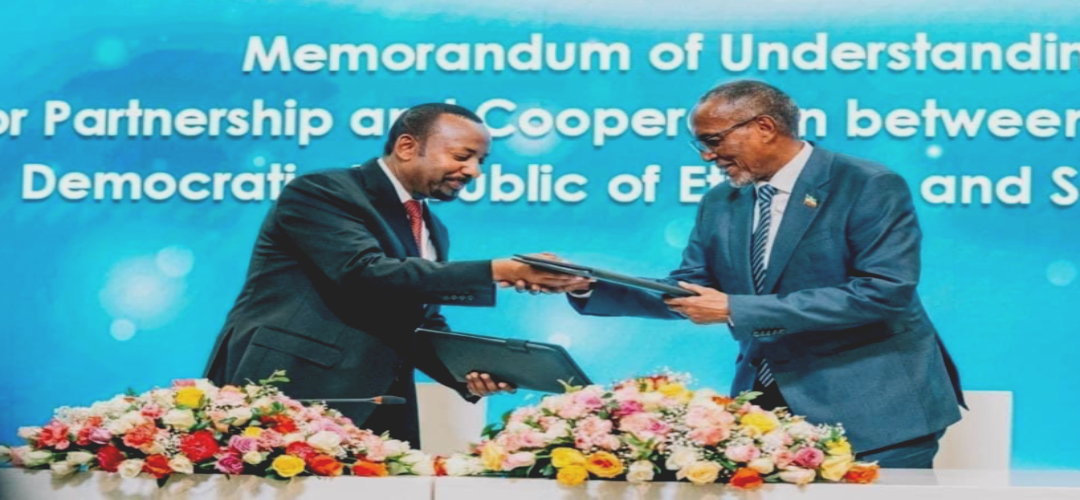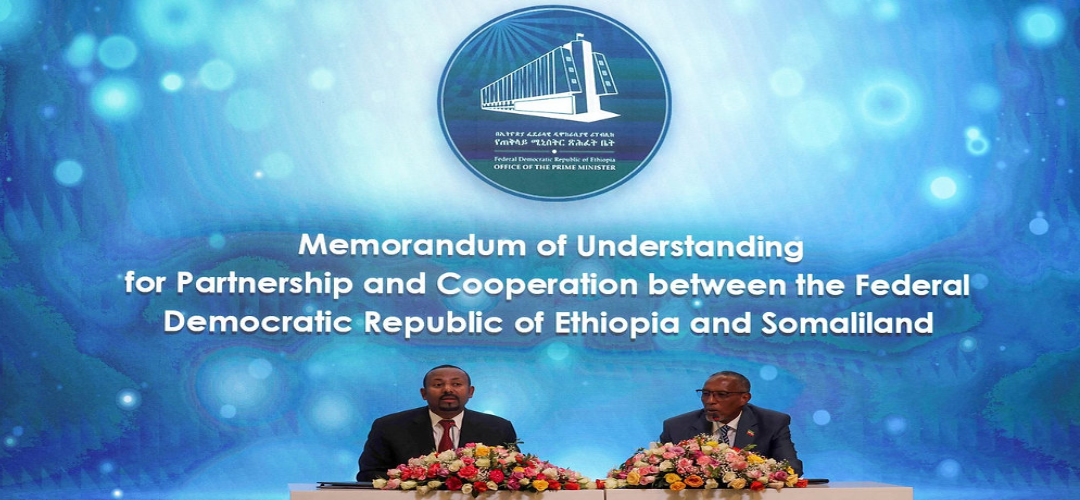A New Conflict Brewing
April 20, 2024 | Expert Insights

“We are ready to go to war," said the spokesperson of the Somalin President in January, when land-locked Ethiopia made public a deal it had struck with the breakaway republic of Somaliland to get access to the seas. Since then, frantic efforts have been ongoing by the neighbouring countries to stave off a war breaking out, although both sides geared up for a prolonged conflict. Sadly, this war-torn part of East Africa has been at the centre of so many conflicts over the last century that the world has stopped taking any notice.
Background
The memorandum of understanding (MOU) signed between Ethiopia and the self-declared state of Somaliland on January 1, 2024, marks a critical juncture in the geopolitical landscape of East Africa. This agreement, which grants Ethiopia a 20-kilometre stretch of coastal land for establishing a naval base and a commercial port in exchange for recognizing Somaliland's independence, has ignited tensions with Somalia and could reshape regional alliances and conflicts.
The MOU represents a significant strategic development with implications that extend far beyond the bilateral interests of the two parties. It is a critical move for Ethiopia, which has been without direct sea access since it became landlocked following Eritrea's independence in 1993.
Ethiopia's landlocked status has posed substantial economic and strategic challenges, significantly limiting its trade capabilities and increasing reliance on neighbouring countries' ports, particularly Djibouti. The high logistical costs and dependency associated with using Djibouti's port facilities have been a major economic burden for Ethiopia. The new facility in Somaliland offers Ethiopia more direct and cost-effective maritime access, potentially reducing its reliance on Djibouti and diversifying its trade routes. This strategic shift will likely enhance Ethiopia's economic resilience and increase its regional bargaining power.
However, the MOU has been met with significant opposition from Somalia, which considers the agreement to violate its territorial sovereignty. Somalia's perception of the MOU as an external endorsement of Somaliland's sovereignty by Ethiopia could lead to increased tensions and possibly military confrontations. Furthermore, as evidenced by this agreement, Ethiopia's increasing influence in the Horn of Africa may alarm neighbouring countries like Djibouti and Egypt, potentially leading them to form alliances with Somalia to counterbalance Ethiopia's strategic initiatives.
Both Ethiopia and Somalia are currently grappling with considerable internal challenges. In Ethiopia, recent ethnic conflicts, particularly the conflict in Tigray, have stretched the nation’s military resources and destabilized significant regions, affecting overall national stability. Somalia continues to battle the Al-Shabaab insurgency, which diverts government resources and attention from broader national security issues. These internal vulnerabilities may exacerbate the risks of external conflict, with governments possibly leveraging nationalist sentiments to distract from domestic troubles.

Analysis
The establishment of a military base in Somaliland as part of the MOU represents a significant militarization step that could be viewed as provocative by neighbouring countries and non-state actors such as Al-Shabaab. This development might trigger an arms race or provoke military skirmishes along the Somaliland-Somalia border, increasing regional security tensions.
The timing of this diplomatic strain is particularly concerning given the ongoing security challenges in the region, notably the threat from Al-Shabaab. This Al-Qaeda-affiliated group has capitalized on the region's instability, staging frequent attacks. The shift in focus brought about by the MOU—from counterinsurgency to broader geopolitical issues—might inadvertently benefit Al-Shabaab, providing it with opportunities to enhance its recruitment and operational capabilities. This shift could divert critical resources and attention from efforts to combat Al-Shabaab, potentially allowing the group greater freedom to operate and expand.
The MOU also holds significant implications for the regional security and economic landscape. The agreement represents a crucial opportunity for Somaliland to break from international isolation, potentially attracting foreign investment and achieving informal or formal recognition from other nations. These nations may recognize the economic and strategic benefits offered by the new port, potentially leading to a realignment of regional alliances and a recalibration of economic networks within the Horn of Africa.
However, these shifts could have dual effects. While potentially enhancing the strategic and economic standing of Somaliland and Ethiopia, they might also exacerbate regional tensions and security dilemmas. The possible reconfiguration of alliances and Somaliland's economic empowerment could prompt other nations to reconsider their positions on recognition and diplomatic relations, reshaping the geopolitical fabric of the Horn of Africa. This delicate interplay of economic ambitions, political aspirations, and security concerns underscores the fragile balance of power in the region, where significant changes can have extensive implications.
In response to these unfolding events, the international community, led by major entities such as the African Union and the United Nations, has advocated for cautious diplomacy.
The reaction from neighbouring countries like Egypt and Djibouti—who view Ethiopia's growing influence with scepticism—adds another layer of complexity to the situation. These countries have demonstrated solidarity with Somalia, potentially forming a strategic bloc to counterbalance Ethiopia's expanding influence in the region. This alliance could affect not only the immediate issues surrounding the MOU but also broader regional matters, such as negotiations over the Blue Nile waters. Ethiopia's construction of the Grand Ethiopian Renaissance Dam has already stirred tensions with Egypt and Sudan, with these downstream neighbours viewing the dam as a significant threat to their water security.
Assessment
- This evolving situation in the Horn of Africa highlights a nuanced interplay between national aspirations, regional dynamics, and the intricacies of international relations. Ethiopia’s engagement with Somaliland through the MOU transcends mere economic interests, aligning with broader strategic objectives to enhance its regional stature. The agreement represents a significant stride for Ethiopia in reclaiming its maritime capabilities, which are crucial for trade and geopolitical leverage.
- This mosaic of diplomatic, security, and economic factors highlights the intricate and volatile dynamics at play in the Horn of Africa, emphasizing the need for a carefully managed approach to prevent further destabilization.
- All parties involved must engage in comprehensive and ongoing diplomatic efforts to mitigate the risks of conflict escalation. International and regional organizations are instrumental in mediating these discussions, tasked with the delicate balance of aligning diverse national interests with the broader goal of maintaining peace and stability in the region.








Comments